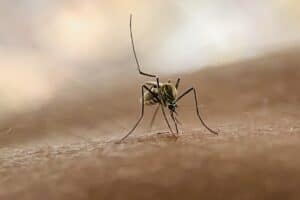South African travellers may be at risk of infection when it comes to various mosquito-borne diseases.

As a common flying insect, mosquitos fall under the same category as flies, fleas and ticks.
They can also be referred to as arthropods an while they appear worthless and often pose as a mere irritation to humans, they actually have an important role to play in the overall food chain.
Did you know?
Mosquitos feed fish larvae, birds, bats and frogs and some species are even essential pollinators. But, apart from this, mosquitos can also function as hosts or vectors for infections.
They spread viruses, bacteria, parasites and ectoparasites.
Which diseases are mosquito-borne?
South African travellers may be at risk of infection when it comes to various mosquito-borne diseases. Here is a list of diseases transmitted to humans from mosquitos – some in South Africa, others in neighbouring countries:
This video is no longer available.
Malaria
Malaria spreads to people through bites of infected female Anopheles mosquitos and is prevalent in sections of three South African provinces, namely Limpopo, Mpumalanga and KwaZulu-Natal. According to the World Health Organisation, 10% of the population (about 4.9 million people) is at risk of developing Malaria.
The first signs of Malaria include fever, headaches and chills. Chills often only show 10 – 15 days after the infective mosquito bite and may be mild and difficult to diagnose.
Malaria can develop into severe sickness and death within 24 hours if left untreated. The CEO of Affinity Health, Murray Hewlett says: “Malaria kills more people than any type of cancer. It kills millions of people worldwide.”
READ: SA winning the war against malaria
Zika Virus
Humans in tropical and subtropical regions of the world might contract the Zika virus through mosquitos. This virus spreads via the Aedes genus of mosquitos and rarely causes symptoms, which means individuals might not be aware of the infection. The virus is rarely fatal and does not often cause serious illness, but it may cause issues during pregnancy, causing congenital abnormalities.
Dengue Fever
This virus is also transmitted by the Aedes genus and is especially prevalent in warm, tropical settings. One of four distinct serotypes causes Dengue virus infections and symptoms vary in severity according to the serotype that causes the disease.
Common symptoms of Dengue Fever include fever, internal bleeding and low platelet count.
There is no cure for Dengue Fever, but clinicians can manage symptoms through supportive care.
ALSO READ: World Malaria Day 2022: Reduce the impact and save lives
Yellow Fever
This virus is a high-risk virus that is preventable by immunisation. It can spread across a wide network of mosquitos in the Aedus or Haemagogus genus. It can infect people and monkeys, depending on the transmission cycle.
Yellow fever is difficult to detect in its early stages, as well as in certain individuals. It can also deteriorate rather quickly.

West Nile Virus
The Culux mosquito genus spreads the West Nile Virus, which has been a serious issue for a growing number of countries since its discovery on the African continent in 1937.
80% of infected individuals are asymptomatic, but this zoonotic virus can cause a range of symptoms including fevers, headaches and severe neurological complications like encephalitis.
Chikungunya Virus
This virus was first found in Tanzania in 1952. It occurred in isolated and sporadic outbreaks in Africa and Asia for the next 50 years and since 2004 it has spread throughout Asia, Africa, Europe and America at a rather fast pace. Over 60 countries currently recognise the virus.
The Chikungunya virus can cause numerous health problems, including fever, headaches, an increased risk of joint pain, fatigue and red eyes. Some symptoms overlap with those of the Zika and Dengue viruses, which also poses the risk of misdiagnosis.

How to survive mosquito-transmitted diseases
Of course, as with most things I life, prevention is better than cure.
- Book appointments with your doctor six weeks before travelling to areas with mosquitos, get the right medication and take it at the right times.
- Wear protective clothing like long sleeves and pants when outdoors.
- Cover mattresses with mosquito nets. They are small, carefully woven and effective in keeping mosquitos at bay. (Remember to regularly check the nets for tears and bring another net on holiday for backup.)
- Use citronella candles and citronella-based bug repellent.
- Use mosquito traps outdoors.
- Apply insect repellents to the skin. You can even apply it to your blankets, which could also be helpful.

When should you consult a medical practitioner?
Many people who contract mosquito-borne diseases won’t necessarily develop any symptoms. This means that they may be unaware that they are carrying a virus. If they manifest, they typically do so within 3 to 15 days of the bite. A person may therefore show symptoms following exposure to a mosquito-borne area and should then consult a medical practitioner.
This video is no longer available.
Support Local Journalism
Add The Citizen as a Preferred Source on Google and follow us on Google News to see more of our trusted reporting in Google News and Top Stories.






